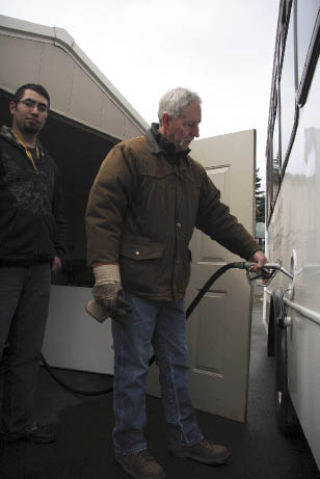When Snoqualmie Valley Transportation bus driver Gary Martin makes a stop, his passengers wonder what’s cooking.
Martin’s bus, like others in the fleet operated by the Snoqualmie Tribe and Mount Si Senior Center, runs almost entirely on vegetable oil — biodiesel.
Consequently, the exhaust carries the odor of fried food.
“Who’s frying chicken,” a Lower Valley rider asked Martin.
“It’s my bus,” he answered.
“It makes me hungry,” the passenger replied.
“People say it smells like French fries,” Martin said. When he tells them where the fuel comes from, riders are surprised.
“It’s a reuse of energy,” Martin said.
Soon, the tribe will begin converting all of its waste vegetable oil from Snoqualmie Casino over to biodiesel.
“We’re just about there,” said Jake Repin, transportation program director for the Snoqualmie Tribe. “We’re waiting on a big enough batch of oil to send it and process it. We’ve got a few more gallons to go.”
“It’s basically a free source of energy,” Martin said. “They used to have to throw it away — it was considered garbage. Now, it’s considered fuel.”
Less gas
Snoqualmie Valley Transportation has used biodiesel since 2007. Over the last two years, the new fuel has reduced carbon dioxide emissions — the chief culprit in global warming — by an estimated 64,000 pounds. Using biodiesel has saved more than 4,000 gallons of regular gas.
“It’s quite the number,” Repin said. “We knew it was going to lower the emissions, but to be able to calculate and come up with the figure — it is pretty amazing.”
Reducing the local impact on nature is part of the tribe’s philosophy, according to Martin.
“It’s getting more important as the climate warms,” he added. “We’re in the middle of it.”
A biodiesel vehicle must be retrofitted to run on the oil. Biodiesel fuel has a low flash point — Martin said a smoker could stand next to fuel tank and fail to spark it — and must be heated before ignition. It also needs an extra filter to remove impurities.
Biodiesel can be made from various kinds of oils.
Locally, buses fuel at Gateway Gas and Deli on Snoqualmie Ridge and at a fueling station at the tribe’s Carnation food bank.
The official name of the fuel is B99.9. For every thousand gallons of biodiesel, there is one gallon of regular diesel.
The tribe is working on expanding its green fleet this summer. Two more biodiesel buses are scheduled to join the fleet this month.



